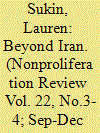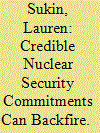|
|
|
Sort Order |
|
|
|
Items / Page
|
|
|
|
|
|
|
| Srl | Item |
| 1 |
ID:
144288


|
|
|
|
|
| Summary/Abstract |
Several states in the Middle East have noted their interest in nuclear energy programs, but current cost and timeline estimates understate the difficulties that these states will face. A state-level analysis of nuclear development capacities in Saudi Arabia, Egypt, Jordan, Turkey, and the United Arab Emirates suggests that building nuclear infrastructure in the region will, in fact, be a lengthy and expensive endeavor, due to concerns such as export constraints, public opposition, a lack of human resources, and high overhead costs. This has implications for nuclear weapon nonproliferation: first, fears that these developing nuclear energy capabilities may facilitate possible weapon proliferation are premature, and second, there is time to ensure that any burgeoning nuclear infrastructure in the region remains safe and civilian in nature.
|
|
|
|
|
|
|
|
|
|
|
|
|
|
|
|
| 2 |
ID:
174720


|
|
|
|
|
| Summary/Abstract |
How does the alliance between a client state and its nuclear ally influence support for proliferation in the client? Conventional wisdom suggests that when nuclear security guarantees are not credible, support for proliferation will be high, since a domestic nuclear capability offers an alternative source of deterrence. I introduce a new theory, which posits that highly credible security guarantees can backfire by causing some individuals to fear their ally might miscalculate—either by using nuclear weapons in an unnecessary preventative attack or by precipitous escalation of a crisis or conflict. Survey experiments conducted among representative samples of South Korean citizens in 2018 and 2019 support this theory, showing that increases in the credibility of the US nuclear security guarantee lead to increased support for nuclear proliferation among South Korean respondents.
|
|
|
|
|
|
|
|
|
|
|
|
|
|
|
|
| 3 |
ID:
192025


|
|
|
|
|
| Summary/Abstract |
When crises occur between nuclear-armed states, do relative nuclear capabilities affect the outcome? The literature offers no consensus about nuclear superiority’s effect on crisis victory, but this article demonstrates that this effect depends on the size of the disparity between states’ nuclear arsenals. Although superiority is correlated with victory in crises between states with similarly sized nuclear arsenals, superiority provides no advantage in asymmetric crises. Because a vastly inferior state risks annihilation in a nuclear conflict, it will acquiesce to an opponent’s demands before the crisis occurs, unless backing down implies an existential threat as well. Given an asymmetric crisis has emerged, therefore, the inferior side will be willing to bid up the risk of nuclear war, deterring superior opponents. Using quantitative analyses of crisis data, this article shows that the positive association between nuclear superiority and crisis victory decreases as the disparity between competing states’ arsenals increases.
|
|
|
|
|
|
|
|
|
|
|
|
|
|
|
|
| 4 |
ID:
178662


|
|
|
|
|
| Summary/Abstract |
A number of proposals for reducing tensions with North Korea have discussed alterations to the program of joint military exercises (JMEs) that South Korea holds. North Korea has also repeatedly called for a reduction or secession of JMEs. Would limiting or halting JMEs be a useful concession for securing a reduction of tensions on the peninsula? We argue that JMEs do not deter North Korea but, instead, provoke provocative rhetoric and actions, demonstrating that North Korea views JMEs as a serious threat to its security. In this paper, we establish a relationship between JMEs and North Korea’s actions. In response to a JME, North Korea can issue warnings or threats as well as take costly signals such as conducting missile or nuclear tests. Using new data on JMEs and North Korean behavior, we find that North Korea systematically responds with aggression to South Korean JMEs. Moreover, we find that the intensity of North Korea’s responses to JMEs is driven by the severity of the threat particular exercises pose, indicating that North Korea responds to JMEs as serious security threats.
|
|
|
|
|
|
|
|
|
|
|
|
|
|
|
|
| 5 |
ID:
179186


|
|
|
|
|
| Summary/Abstract |
One of the Biden administration’s top foreign policy challenges is to reinvigorate US alliances. Regional threats in Eastern Europe and Northeast Asia have become more complex in recent years, just as President Trump hastened allies’ and partners’ doubts about US security commitments. It is tempting for officials in Washington and in allied capitals to think or hope that increasing the salience of nuclear deterrence can help to meet the challenges of deterring growing threats and assuring nervous allies. This temptation is especially pertinent in Northeast Asia, which lacks the multi-party alliance and nuclear sharing structures institutionalized in Europe through the North Atlantic Treaty Organization (NATO).
|
|
|
|
|
|
|
|
|
|
|
|
|
|
|
|
|
|
|
|
|